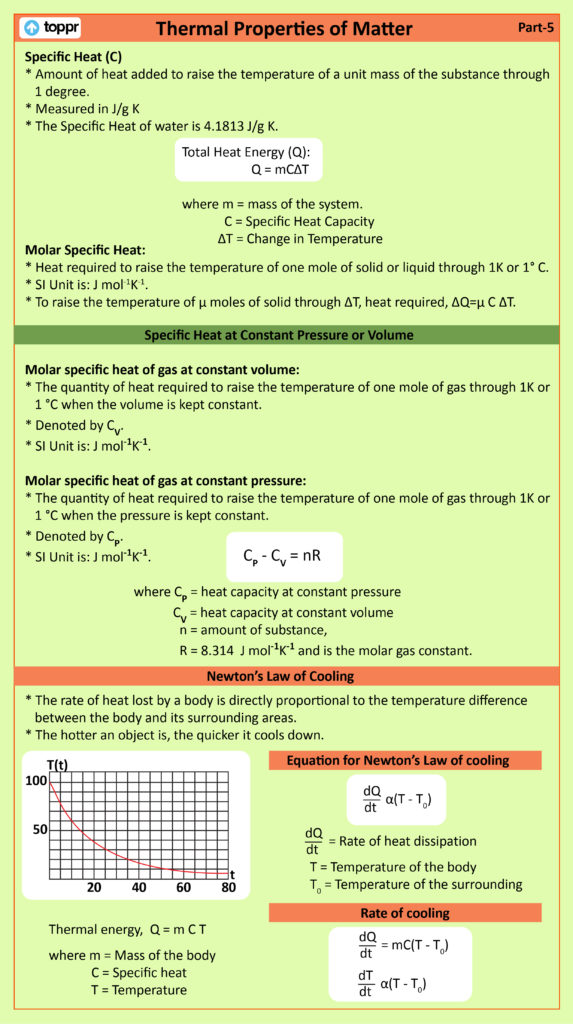When you are out on the beach, have you noticed that the water is cold whereas the sand is hot! The sun is the same there, then why this difference in the temperature? You must have given it a thought! The temperature of a solid and liquid element rises when we supply heat to it. If we supplied the same amount of heat to two different kinds of solid then rise in temperature may be different in both the solids. So, depending upon the nature of the solid, the rise in temperature varies for different kind of solids. This phenomenon is known as Specific heat Capacity.
Suggested Videos
Definition
In other words specific heat of a solid or liquid is the amount of heat that raises the temperature of a unit mass of the solid through 1° C. We symbolise it as C. In S.I unit, it is the amount of heat that raises the temperature of 1 kg of solid or liquid through 1K.
Its unit in S.I system is always given as J kg-1 K-1 and CGS as cal g-1 C-1. If the amount of heat, ∆Q, required to raise the temperature of mass M through ∆T, then the formula for specific heat is given by:
Browse more Topics under Thermal Properties Of Matter
- Calorimetry
- Change of State
- Heat Transfer
- Ideal Gas Equation and Absolute Temperature
- Newton’s Law of Cooling
- Temperature and Heat
- Thermal Expansion
C= ∆Q/m*∆T or ∆Q=m C ∆T.

Molar Specific Heat
The Molar specific heat of a solid or liquid of a material is the heat that you provide to raise the temperature of one mole of solid or liquid through 1K or 1° C. We represent it as C. Its unit is J mol-1K-1. So, to raise the temperature of µ moles of solid through ∆T, you would need an amount of heat equal to ∆Q=µ C ∆T.
The molar specific heat capacity of a substance is nothing but the amount of heat you need to provide to raise the temperature of one gram molecule of the substance through one degree centigrade. It is denoted by C. Specific heat of water is taken to be 1. This is because of the reason that we defined unit of heat (calorie) by making use of water.
Specific Heat at Constant Pressure or Volume
- The volume of solid remains constant when heated through a small range of temperature. This is known as specific heat at a constant volume. It is denoted as CV.
- The pressure of solid remains constant when heated through a small range of temperature. This is known as specific heat at constant pressure which can be denoted as CP.
The behavior of gas when heat is supplied, the pressure and volume change in temperature and the amount of heat required to raise the temperature for 1gm of gas through 1°C depends on the way gas is heated. You can use several sets of values of P and V heat the gas.
Therefore, specific heat possesses infinite values. The specific heat of the gas is not constant if you do not supply a constant amount of heat. So, you must have specific heat at a constant volume or pressure. For an ideal gas,
CP – CV = nR
where
Applications
- The utensils used for cooking use a material of low specific heat. You can heat their bottoms quickly. This is because they have aluminium or copper polished bottoms. The handle of these utensils is made of high specific heat material to sustain the heat and to save our hands.
- Insulators use materials of high specific heat. For example wood. House made of wood are more useful in High temperature or Low-temperature area.
- Due to a high specific heat of water, in swimming pool, water used to be cool as compared to the temperature outside.
You can download Thermal Properties of Matter Sheet by clicking on the download button below

Question For You
Q. Give the definition of molar specific heat.
Ans: For a solid or liquid it is the heat that us required to increase the temperature of one mole of Solid or Liquid through 1K or 1° C.






Leave a Reply